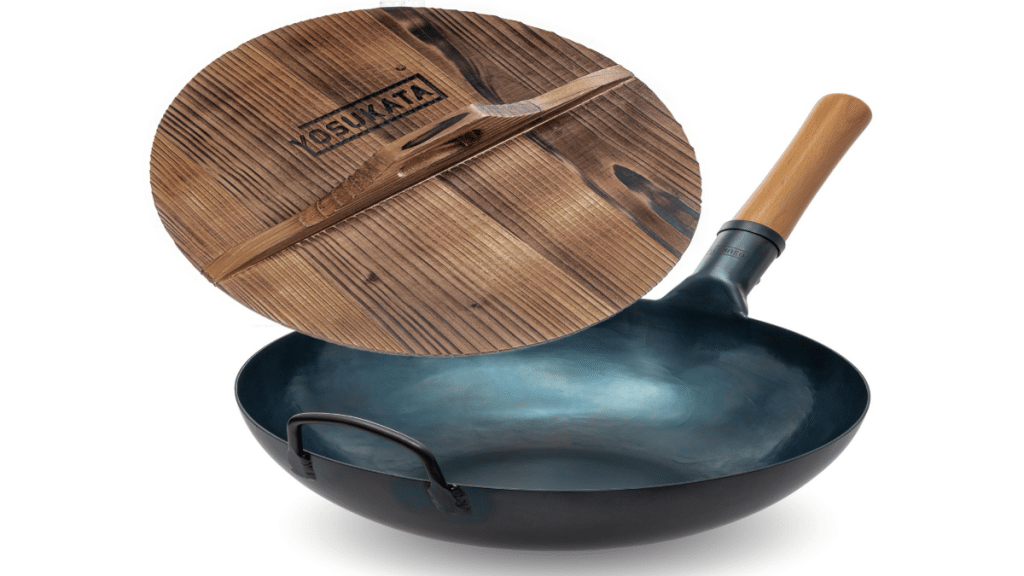Woks have been a cornerstone of Asian cuisine for centuries, prized for their versatility and ability to handle high-heat cooking. When choosing a wok, one of the critical decisions is selecting the right material. In today’s market, woks are available in various materials, each offering unique properties that affect cooking performance, durability, and maintenance.
Woks are not just cooking vessels; they’re cultural icons that have evolved over millennia. Traditionally made from materials like cast iron, carbon steel, and more recently, stainless steel, woks vary widely in their heat conductivity, weight, and seasoning requirements. Among these, carbon steel woks have gained popularity for their lightweight yet durable construction and excellent heat retention capabilities. Let’s delve into how they stack up against stainless steel and cast iron counterparts.
Types of Wok Materials
Carbon Steel Woks: are renowned for their rapid heat response and even heat distribution. They are typically lighter than cast iron woks, making them easier to handle, especially during vigorous stir-frying. However, they require seasoning to develop a natural non-stick surface and to prevent rusting. Once seasoned, they provide a slick cooking surface ideal for quick, high-heat cooking techniques like stir-frying.
Stainless Steel Woks: are prized for their durability and resistance to corrosion. They do not require seasoning and are generally easier to clean and maintain. However, stainless steel is not as efficient at conducting heat as carbon steel or cast iron, which can affect cooking times and the ability to achieve the high temperatures needed for authentic stir-frying.
Cast Iron Woks: are revered for their exceptional heat retention and ability to retain seasoning, making them naturally non-stick over time. They excel in heat distribution but are significantly heavier than both carbon steel and stainless steel woks. Cast iron woks require careful maintenance to prevent rust and maintain their seasoning, which can be more labor-intensive compared to other materials.
Comparison Factors
Heat Conductivity and Retention: carbon steel woks heat up quickly and distribute heat evenly across the cooking surface, making them ideal for quick cooking techniques. Stainless steel woks are slower to heat up and distribute heat less evenly than carbon steel. Cast iron woks heat slowly but retain heat exceptionally well, which can be advantageous for dishes requiring steady, prolonged cooking.
Weight and Durability: Carbon steel woks strike a balance between durability and weight, being lighter than cast iron yet robust enough for frequent use. Stainless steel woks are durable but tend to be heavier, particularly in thicker gauges. Cast iron woks are the heaviest but also the most durable if properly cared for.
Seasoning and Maintenance: carbon steel and cast iron woks both require seasoning to develop a non-stick surface and prevent rust. Stainless steel woks do not require seasoning but may require more attention to prevent sticking. Cast iron woks need regular seasoning and careful drying to maintain their protective layer.
Compatibility with Cooktops: Carbon steel woks are versatile and suitable for use on gas, electric, and induction cooktops with proper care. Stainless steel woks are also compatible with all cooktops but may not provide as even heat distribution as carbon steel. Cast iron woks are suitable for all cooktops but are particularly well-suited to gas and induction due to their heat retention properties.
Performance in Cooking
Stir-Frying: Carbon steel woks excel in stir-frying due to their ability to quickly heat up and maintain high temperatures. They allow for rapid tossing and cooking of ingredients without cooling down excessively. Stainless steel woks can be used for stir-frying but may require more oil to prevent sticking. Cast iron woks are excellent for stir-frying once seasoned but may be slower to heat initially.
Deep-Frying: All three materials can be used for deep-frying, but carbon steel woks are preferred for their lightness and quick response to temperature changes. Stainless steel woks are durable but may require more oil due to potential sticking. Cast iron woks are excellent for deep-frying once seasoned but can be heavy and cumbersome to handle.
Steaming and Simmering: Cast iron woks excel in steaming and simmering due to their heat retention, allowing for even cooking without hot spots. Carbon steel woks are also suitable for steaming but may require careful monitoring of heat. Stainless steel woks can be used for steaming but may not retain heat as well as carbon steel or cast iron.
